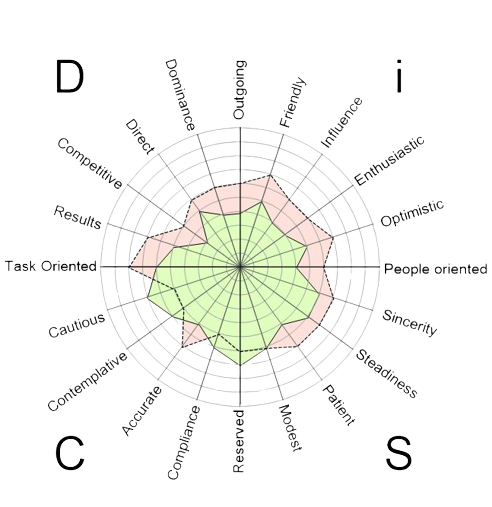Mindset mapping,
character profiling
Analyzing texts with Dialexity enables you to profile people according to different scales, such as DiSC, MBTI, or any other personality assessment tool.

Partnership opportunity
Organisations, mediators, consultants, and coaches can leverage Dialexity's know-how to better serve their clients
Request integration
Become a partner“ Understanding my coworkers has never been easier. With Dialexity's Mindset mapping, I can adjust my communication style to better match their DiSC profiles. Collaborations have never been smoother. “
Mindset metrics
We've developed parameters to organize many thinkers, ranging from Lao Tzu to George Orwell, into a coherent system. These parameters, organized as "dialectical pairs", ensure balance and circular causation, enabling us to map individuals to these thinkers and derive useful insights about the personality.
The breadth and depth of views:
- Dogma. Firmly fixed in one’s beliefs.
- Naive Certainty. Basic views, with minimal exploration.
- Opportunism. Adjusts views for immediate gain.
- Functional Idealist. Dominantly pragmatic with some openness to broader ideas.
- Dual-Aspect. Juggles theory with practice but may lean more towards one.
- Analytical Thinker. Delves deep into ideas, philosophically rich but may not always reach a conclusive synthesis.
- Pragmatic Pluralism. Open to a multitude of ideas, selects based on practicality but with a depth of understanding.
- Literary Synthesis. Explores human nature and the world through narratives, weaving intricate understandings of different views.
- Philosophical Synthesis. Deeply contemplates the nature of existence, ethics, and the universe, aiming to integrate varied views.
- Holism. Achieves a unified understanding and harmony among all perspectives.
The balance between material and spiritual considerations:
- Materialist. Views matter as primary; mental/spiritual elements are secondary outcomes of material processes.
- Physicalist. Favors matter but recognizes some non-material influences.
- Dualist. Values mental and physical as independent, equal forces.
- Transcendent. Prioritizes mental/spiritual slightly over material but sees importance in both.
- Immaterialist. Leans towards mind/spirit but admits material as a reflection of the mental.
- Idealist. Views reality as fundamentally mental or spiritual; materiality is a mental manifestation.
The focus of the content, ranging from universal truths to political insights:
- Universal. Tuned into cosmic truths and universal principles, akin to Lao Tzu.
- Natural. Aligned with nature, exploring tangible phenomena and universal laws.
- Introspective. Delving into inner worlds, embracing psychological and mystical constructs.
- Relational. Centered on close personal relationships like family and friends.
- Societal. Engaged with societal norms, structures, and cultural dynamics.
- Political. Zeroed in on politics, governance, and global dynamics, reminiscent of George Orwell.
The blend of logic and emotion:
- Formalist. Adheres strictly to forms, rules, and logic, resembling a machine.
- Pragmatist. Blends established methods with some intuitive insights.
- Explorer. Navigates between established logic and blossoming creativity.
- Innovator. Seamlessly integrates logic and creativity.
- Visionary. Prioritizes emotion and imagination, foresees future trends.
- Poet. Crafts the future through inspired and artful expression.
The positivity and hopefulness:
- Depression. Depressing and destructive.
- Pessimism. Emphasizes dangers and risks.
- Skepticism.
- Realism.
- Optimism.
- Elevation. Very uplifting, emphasizes hope and growth while conveying the main message.
The emotional warmth and depth, from mechanical to deeply nurturing:
- Mechanical. Operates solely on logic; devoid of warmth, like a machine.
- Reserved. Limited warmth; adheres to social norms without deep emotion.
- Neutral. Balanced; shows cordiality as needed but can be distant.
- Amiable. Genuinely warm; heart and mind guide interactions.
- Compassionate. Deeply empathetic; a comforting presence in crises.
- Motherly/Fatherly. Pinnacle of warmth and care, like an ideal parent.
The balance between tangible experience and abstract thought:
- Sensory & Experiential. Direct, tangible experiences. Typical of artists or craftsmen.
- Practical & Grounded. Empirical wisdom from daily life and tangible existence, like HD Thoreau.
- Analytical & Systematic. Logical, methodical reasoning. Typical of engineers or researchers.
- Theoretical & Speculative. Merging concrete and abstract understanding. Seen in scientists and esoterics.
- Philosophical & Integrative. Bridging physical and metaphysical realms. Think Plato or Aristotle.
- Metaphysical & Cosmic. Delving into abstract cosmic principles. Figures like Lao Tzu.
The potential influence on audiences:
- Detrimental. No notable influence on others or the environment.
- Minimal. Noticed but doesn’t significantly affect the recipient or wider audience.
- Engaged. Causes transient reactions; limited broader influence.
- Contributive. Creates lasting impressions or changes opinions; moderate wider influence.
- Influential. Resonates deeply, prompting change or action; significant ripple effects.
- Transformative. Profoundly impacts recipient; sets widespread, lasting precedents.

Looks interesting?
Let's get in touch